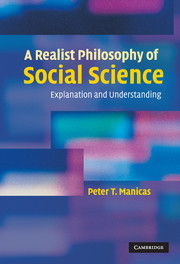Book contents
- Frontmatter
- Contents
- Acknowledgements
- Introduction
- 1 Explanation and understanding
- 2 Theory, experiment and the metaphysics of Laplace
- 3 Explanation and understanding in the social sciences
- 4 Agents and generative social mechanisms
- 5 Social science and history
- 6 Markets as social mechanisms
- Appendix A The limits of multiple regression
- Appendix B Comparison, Mill's methods and narrative
- Appendix C Rational choice theory and historical sociology
- Appendix D The neo-classical model
- References
- Index
Appendix D - The neo-classical model
Published online by Cambridge University Press: 12 November 2009
- Frontmatter
- Contents
- Acknowledgements
- Introduction
- 1 Explanation and understanding
- 2 Theory, experiment and the metaphysics of Laplace
- 3 Explanation and understanding in the social sciences
- 4 Agents and generative social mechanisms
- 5 Social science and history
- 6 Markets as social mechanisms
- Appendix A The limits of multiple regression
- Appendix B Comparison, Mill's methods and narrative
- Appendix C Rational choice theory and historical sociology
- Appendix D The neo-classical model
- References
- Index
Summary
For the interested reader, this appendix adds some detail and argument to the discussion of neo-classical economics. Following Hausman (1984), it may be convenient to distinguish “equilibrium theory” from “general equilibrium theory.” Static equilibrium theory may be defined in terms of the following fundamental assumptions. These comprise the core of mainstream micro-economics:
1. For any individual A and any two options x and y, one and only one of the following is true: A prefers x to y, A prefers y to x, A is indifferent between x and y.
2. A's preferences among options are transitive. (If A prefers x to y and y to z, A prefers x to z.)
3. A seeks to maximize his or her utility where the utility of an option x is greater than the utility of an option y for A if and only if A prefers x to y. The utilities of options are equal just in case the agent is indifferent between them.
4. If option x is acquiring commodity bundle x′ and option y is acquiring commodity bundle y′ and y′ contains at least as much of each commodity as x′ and more of at least one commodity, then all agents prefer y to x.
5. The marginal utility of a commodity c to an agent A is a decreasing function of the quantity of c that A has.
The foregoing postulates define the rationality of actors. The following define the assumptions of production.
6. When we increase inputs into production, other things being equal, output increases, but, after a certain point, at a decreasing rate.
[…]
- Type
- Chapter
- Information
- A Realist Philosophy of Social ScienceExplanation and Understanding, pp. 186 - 199Publisher: Cambridge University PressPrint publication year: 2006

